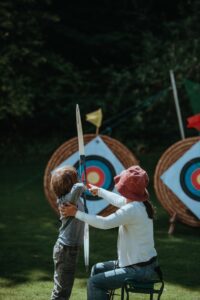ARROWS & SHOTGUNS
approaches to creating workshops
What makes a great workshop?
How do improvisers create memorable, inspired classes which leave long lasting impacts on students?
Here are some tips and a couple of case studies that might give some answers.
Special thanks to long time teacher, performer and friend of the Improvisation school, GIUSEPPE MARCHEI. Based in Rome, Italy with his group, I Bugiardini, Peppe has offered his insights on creating a workshops with hi-lights from his “WHY SO SERIOUS?” workshop. Contact him to find out more.
Inspiring the Improviser
I like walking into a room of students and feeling that the possibilities are endless. I like knowing that I might learn something from the collection of students who consider me the teacher.
I love leaving the class late because the students were into the exploration and forgot the time. (or… as has happened more than once… intentionally mislead me about how much time is left at the end of the day!)
At the other end of the spectrum, when the ideas are foggy and the students are grasping for motivation, it’s good to have tools to fix the issues so the target can be reached.
HOW TO CREATE A WORKSHOP THAT LEAVES AN IMPACT:
- Know What You Want
- Respect The Students
- Adapt
Are you doing it for the money? — You better have some good skills already. If you get into this mainly for the pay, you aren’t likely to develop work that inspires people for long. Eventually you will be the one lacking inspiration.
If you do it for the money, LISTEN to who’s hiring you. Develop the work that they ask for. (secretly, I hope money isn’t your main goal. You are most likely to mislead students because your inspiration to develop is based on creating a “marketable”, rigid, “product”.)
Are you creating workshops to develop a group? Your long term vision is important. You might be bored of basic work but your group needs a solid foundation to build the future work on.
- Be consistent.
- Risk being repetitive.
- Take risks to challenge some of the students who will in turn, pull others forward through the examples of the work they show.
- Create lessons that are broad enough to address unique skills held by people in the group while at the same time creating lessons that teach “simpler” techniques for everyone to connect with.
Are you teaching because you want to explore ideas that fascinate YOU? There’s something important in this. Teachers with passionate ideas about what they want to develop, inspire their students to create. These teachers don’t just teach exercises. They teach a mindset.
Make sure that you don’t lose track of the fact that it can’t ALL be about you. Find inspiration in the student as they explore and grow in your class.
Respect the student. They are there for their own reasons. Many students won’t tell you what they need. Many don’t know. You might have to dig deep and explore their actual work and attitude to create the correct workshop for them.
Watch their body. Their words might speak confidently but their actions might be screaming for something else in class. They will feel greater inspiration in your class if you offer them tools that highlight skills they didn’t know they were missing.
And you have to adapt. All the time.
There comes a time when the class needs to move on from what they’ve been doing. Their brains are full. Consider when to take breaks. A little more break time than they want is usually best. “WE DON’T NEED A BREAK!” is often said in classes that burn out near the end. Give them time to think, chat, pee, and not hear the sound of your voice. The workshop continues in their heads in a healthy, varied way.
Know when to pair people up and work away from everyone else’s observations.
Get a feeling when they would learn best by sitting in an audience and watching each other perform. Visual learners need that.
Composing your workshop is like target practice.
Do you have an end result you want to achieve, – specific skills for shows that night, for example. That target calls for direct teaching that pulls people into a very narrow frame of thought like an arrow being shot to the bullseye.
When you work with a diverse group of improvisers who want to “have fun” or “just learn “something” or say they want to learn “everything” then the target is wide open. Your target is broad, based on the inspiration from the people right there beside you. You blast with a shotgun of skills scattering the ideas knowing that the right targets will be affected.
I dislike using such a violent image as a metaphor for teaching but…
The arrow approach is a direct and narrowly focused workshop usually aimed at one topic, with more pre-planning while the shotgun technique is broad and hits many ideas, possibly with more adaptability to the needs of the moment and less pre-planning.
The ARROW and the SHOTGUN
THE ARROW:
 You’re developing a workshop for your group and you have a specific idea. You want to improve their connection to each other, for example. You add exercises like “Do you Remember When?” and “Collapsing Walls“.
You’re developing a workshop for your group and you have a specific idea. You want to improve their connection to each other, for example. You add exercises like “Do you Remember When?” and “Collapsing Walls“.
Your hope is that they will develop the tools to connect with each other better with physical contact and emotional idea sharing. You limit yourself to the topic you promised.
Your target is clear and your ideas are focused arrows specifically aimed and direct.
THE SHOTGUN:
 Next week, you decide to start the class by teaching a few basic concepts or asking participants to do a few open scenes to start the class. You have no idea where the class will go. You might not even know anything about the students.
Next week, you decide to start the class by teaching a few basic concepts or asking participants to do a few open scenes to start the class. You have no idea where the class will go. You might not even know anything about the students.
As the workshop goes on, you discover the needs of the individuals in the group and you keep adapting to inspired moments and address a variety of issues. Character, relationship, narrative, attitude…etc.
Your target is broad (“Improve their skills”). Your shotgun approach sprays the skills widely, affecting various topics.
ARROW
SHOTGUN
ADVANTAGE
- For those who like plans, and curriculums, the Arrow approach is for you
- For groups with specific issues that they want to look at, this is the way to go.
- Under a time limit to develop an idea or skill? Probably smart to develop a workshop in this style
- Good for established groups that plan on long term development of specific shows.
- More easily marketed to participants because people are more willing to risk paying for ideas they can grasp… rather than “open concepts”.
- The Shotgun approach lends itself to the teacher with a broad base of knowledge.
- It’s great for groups who are uncertain about their needs and ones that are early in their development but also useful for advanced groups who have are inspired to add to the process.
- This approach tends to be most adaptable and good with teachers who can let go of planning to adapt spontaneously to group needs.
- It excels at addressing “teachable moments” that haven’t occurred to the teacher during the planning process.
- More related to the idea that improvisation is flexible, and can address the actual people present instead of being locked into an idea that is no longer relevant.
DIS-ADVANTAGE
- Can limit adaptability and spontaneity
- When the groups skills don’t match the needs of the workshop, progress is slow and frustrating.
- Some participants might feel frustrated that their needs haven’t been seen.
- Developing this style of workshop takes more time.
- Uninspired teachers and those without strong empathy to the group, fail in their response to address the most important needs in the moment.
- Without SOME direct focus, lessons can miss their targets if not backed up by practice or follow up exercises.
- Some participants might feel frustrated that the information was too broad.
PEPPE DEVELOPS AN IDEA!
“ A Few weeks ago I finished my WHY SO SERIOUS? class and I would like to share some thoughts around this experience with you.”
GIUSEPPE MARCHEI. (Peppe) chatted with me about the development of his workshop:
WHY SO SERIOUS? – PLAYING AROUND PLAYFULLNESS
This seemed like a good chance to look at how one person developed his workshop as a way to consider working on your own… Or consider bringing Peppe in to teach.
ORIGIN FOR THE WORKSHOP
PEPPE: …our adult brain creates some very big important difference between PLAY and WORK.
- PLAY: the place for relaxing and having fun,
- WORK: related to effort, tension,
These are important meanings. I noticed the same kind of pattern in many improvisors, included me of course, when You talk about GAME or SCENE. The first one giving more permission to enjoy, explore the experience, having some fun; the second one creating a more “serious” environment.
In my opinion, an inspiring scene should contain the same amount of joy and engagement in players that “games” usually creates in players.
So I tried to explore this idea in the class, in order to create a balance between playfulness and quality of the scenes.
Training our playfulness is an important skill as there are usually more chances to create a good scene starting with the desire to explore and play with our partner rather than by the desire to create intellectually a good scene.
INSPIRATION & WHAT WE DID IN THE WORKSHOP
One of the main concepts, inspired by Shawn’s point of view, that we used and explore in the workshop is the idea to PLAY THE PARTNER. This is related but larger than the idea of PLAYING WITH YOUR PARTNER. It allows You to play, for example, a secret goal that You want for the partner to achieve during the scene and it helps to shift the focus from the inside of our “brilliant amazing brain” to the outside of what is already going on and find some joy in playing the scene. I was also inspired by a JOB INTERVIEW EXERCISE that I learned from Patti Stiles, that help us to remember and train how change and working to provoke a change in our partner is important and useful tool for our scene work. Mark Jane’s book – a must have for me in the impro library – where he talks about our “AAAAHHH moment” and how to deal with them efficiently was of great help.
Mischief was another main concept of the workshop, encouraging people to deliberately work to not’ make the scene work properly.
At the end I am happy that work which started very spirit related, gave people the chance to find practical tools to use to train the spirit.
Some things worked better, some things were useful for some people and not so useful for others.
I think it is fine to end a workshop having learned something but knowing that there are “non eternal right answer in our game.”
PERSONAL FEEDBACK – A NOT SERIOUS GAME
As a bonus track at the end of the workshop, we tried a game that can also be useful to increase awareness of students, while they are having some fun (and probably encourage them to be more open to learn from what they are doing).
In my classes I use cards with some secrets to inspire players a lot – status level, secret goal for the scene, etc.
- In this exercise, I wrote the name of students on cards.
- I asked 2 people to go on stage and play a scene.
- Before they started their scene, they picked a card, read the name, and tried to play the scene as that person would do (in their interpretation).
- I underlined to them that it should not be exaggerated or parody the person. They should try to play how that person would.
- At the end of the scene, I ask the audience to guess who the improvisers played and why they made their choices, before the players reveal who was on their card.
This exercise requires some confidence between people in the class. They should also have time to develop their idea about how another person usually plays. In a good spirit it could be very useful from the both sides:
- – If You are playing the scene, it can help You to play in a different way from your classical way as the card gives You permission to explore freely.
- – As the person whose card has been chosen, it can be interesting to hear what others think You do when You play. You get some idea of how others see You. The interpretation is not right or wrong. It is one person’s viewpoint, but it is useful to be aware of other people perceptions.
Also, when an audience as a whole can easily recognize someone through the other persons portrayal there’s a good chance that there is an underlaying quality that the person can recognize and agree, “Yes, that’s me”.
This awareness becomes useful if You want to develop your impro skills.
CLASS FEEDBACK, THOUGHTS, EVALUATION
They founded the topic interesting. They related to this attitude that scene work is something that requires tension and stress, something we all have experienced in our impro journey.
They appreciated that the workshop gave them practical tools to play scenes by being more focused on simply PLAYING, being connected to the partners, and being present in the moment. It was easier for them than the intellectual attitude typically associated with their scene work.
There were some troubles to develop the work organically with some participants being unpredictable in their attendance and others attending all sessions. It is something difficult to manage efficiently for me and it impacted the work for sure. – The workshop was 16 lessons/48 hours/ class
Probably I could have start earlier to work a bit on that but I did not take the risk. Bad Peppe.
Conclusion:
It was the first time I tried to explicitly work on this kind of thing and I think that it was an interesting experience for me and I hope for the class too. I learned something and I would like to explore more, especially the last part: application to long form.
In Peppe’s development there’s a good sense that this is a WORK IN DEVELOPMENT. Great workshops are like that. They NEVER stop developing. Why should they? Student’s will always bring other elements to the equation. That calls on the teacher to evolve and adapt to a new reality.
Getting feedback is important. Be aware if the students are trying to protect you by being too kind. It’s difficult to get impartial feedback so read between the lines and ask specific questions.
Were you inspired? Were questions raised for you about what to explore and what might be interesting to experiment with? If you answered YES, you are probably on the right track to create a useful workshop.
Interested in contacting Peppe to ask a question, offer input or possibly engage for a workshop with your group??? Contact him by clicking HERE!




0 Comments